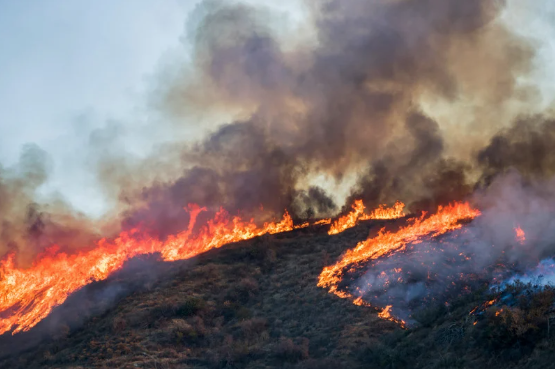The recent fires have significantly affected everyone in the surrounding areas of Los Angeles and Ventura counties due to the poor air quality, power outages and not being able to access their homes and businesses. In many cases, losing them altogether.
Below are regulations and important considerations that employers must keep in mind to stay compliant during these difficult times.
Wildfire Smoke Regulations
Employers impacted by these wildfires must comply with regulations monitored and enforced by the California Division of Occupational Safety and Health (Cal/OSHA).
Workplaces are exempt from complying with the Protection from Wildfire Smoke rule if the worksite is completely enclosed and has mechanical ventilation, if employees are exposed to poor air less than one cumulative hour during their shift, or if the employee is a firefighter currently assisting with the fires.
All other employers that are not exempt from this regulation must monitor the Air Quality Index (AQI) and particulate matter (PM) using a reliable source and take the following measures to protect their teams:
- If AQI exceeds 150 for a PM of 2.5, employers must immediately relocate workers to an enclosed building with mechanical air filtration or other outdoor location with an AQI lower than 150.
- If AQI for PM 2.5 is between 151 and 500, employers must offer N95 masks for optional use.
- If the AQI for PM 2.5 is greater than 500, employees must use a properly fitting respirator while working.
Navigating Compensation During Natural Disasters
The current California wildfires can significantly disrupt business operations, which in turn affects how employees are paid.
Nonexempt employees are usually only paid for the hours they work. If employers send their workforce home in relation to the current wildfires before completing half their shift, then they will not owe reporting time pay. This exception only applies during a natural disaster; under normal circumstances the employer would owe reporting time pay. Nonexempt employees would not get paid while the business remains closed, unless they perform work. Split-shift premiums would need to be paid if the employee is sent home early but is required to return to work later that day. If the employee works under Alternative Workweek Arrangements (AWW) and has a change in schedule, employers may need to provide overtime pay for work exceeding eight hours per day on a regularly scheduled workday.
On the other hand, exempt employees must receive their full salary if they work any part of the week. If they don’t work, employers may choose to withhold pay.
Unemployment Claims Impacted by Los Angeles and Ventura Counties Fires
Due to the recent fires, California Governor Gavin Newsome has waived the one-week waiting period for unemployment benefits for workers impacted by the Los Angeles and Ventura counties fires.
Employers in affected areas can also request a 60-day extension for filing state payroll reports or deposit payroll taxes without incurring penalties or interest. To do so, employers must send a written request to the EDD within 2 months of an original payment or return due date.
Addressing Time Off
Starting January 1, 2025, California’s Healthy Workplaces, Healthy Families Act allows agricultural workers to take paid sick leave during local or state emergencies, such as the current California wildfires, even if their worksites are closed.
Employees can also use sick leave to care for themselves or qualifying family members if this natural disaster causes health-related issues.
When it comes to vacation time, it’s up to the employer’s company policy whether they’ll allow employees to use it during this time. Whatever the employee decides must be implemented consistently among all employees.
Under California’s school activities leave, employees at worksites with 25+ employees can take up to 40 hours of unpaid leave per year if their child’s school or daycare closes unexpectedly due to wildfires or other emergencies.
California Wage Theft Notice
Employers in Los Angeles and Ventura counties must notify all nonexempt employees hired within the 30 days following January 7, 2025, about the wildfire emergency proclamation if it could impact their workplace health and safety. This requirement is part of the California Labor Code Section 2810.5 on the wage theft notice form and must be clearly documented as a section within the employees’ new hire paperwork.
Employees Serving as Relief Workers
Employees serving as wildfire relief workers may be protected under the Uniformed Services Employment and Reemployment Rights Act (USERRA), just like National Guard or reservist members do. In doing so, the employer must conform with the following:
- Employees cannot be discriminated against by being denied employment, promotion or any other employment benefit.
- Eligible employees serving under USERRA can receive up to five years of unpaid leave while maintaining their seniority, health and pension benefits.
- After serving, employees should be allowed to return to work when applying to do so in a timely manner.
Moving Forward
Since wildfire situations can change quickly, employers should work with legal experts to address any important legal concerns during this time. Please reach out to UniqueHR at 800.824.8367 for a free consultation to address how we can help you.


